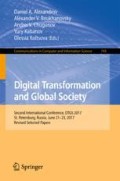Abstract
The ‘VKontakte’ social network is increasingly becoming a useful source of data for studying many aspects of Russian social life. This research paper uses this source to investigate one of the most crucial issues for many young Russians – how successful are Russia’s leading universities in the employability rates of their graduates on completion of their studies. Official data from the Ministry of Education and Science of the Russian Federation show fairly high rates of employment, but the methodology used gives us little indication of the extent to which their employment corresponds to the professional or occupational specialism they acquired at their university. The analysis with the use of the ‘VKontakte’ network provides significant insight into this question. This paper presents results about the employability of graduates from the leading Russian universities participating in the 5–100 Competitiveness and Growth Program specifically in the subjects of “Mathematics and Information Technology” and “Engineering” where a high degree of correlation between subject specialism and employment is expected (The Russian Academic Excellence Project aiming at bringing 5 Russian Universities into their list of the Top 100 world universities (For more details see: http://5top100.com/)).
Notes
- 1.
Ratings of Universities Reputation (RA Expert). Rating “100 best Russian universities”, 2016 http://raexpert.ru/rankings/vuz/vuz_2016/#3.
Russian Education. Federal Portal. http://www.edu.ru/ratings/reyting-vuzov-rossii-2016/.
References
Androsova, E.V.: Evaluation of the effectiveness of employment universities graduates (gender aspect) In: Economic Science and Practice: Materials II International. Scientific Conference, pp. 60–62. Publishing House: Young Scientist, Chita (2013)
Baldry, K.: Graduate unemployment in South Africa: social inequality reproduced. J. Educ. Work 29(7), 788–812 (2016). doi:10.1080/13639080.2015.1066928
Blackmore, J., Gribble, C., Rahimi, M.: International education, the formation of capital and graduate employment: Chinese accounting graduates’ experiences of the Australian labour market. J. Crit. Stud. Educ. 58(1), 69–88 (2017). doi:10.1080/17508487.2015.1117505
Boden, R., Nedeva, M.: Employing discourse: universities and graduate ‘employability’. J. Educ. Policy 25(1), 37–54 (2010). doi:10.1080/02680930903349489
Bourner, T., Millican, J.: Student-community engagement and graduate employability. J. Widening Participation Lifelong Learn. 13(2), 68–85 (2011)
Bridgstock, R.: The graduate attributes we’ve overlooked: enhancing graduate employability through career management skills. J. High. Educ. Res. Dev. 28(1), 31–44 (2009)
Hi-Tech Mail.ru: Panic in social networks: Russians massively close their accounts. https://hi-tech.mail.ru/news/social_network_danger/
Imdorf, C., Helbling, L.A., Inui, A.: Transition systems and non-standard employment in early career: comparing Japan and Switzerland. J. Educ. Work (2016). doi:10.1080/13639080.2016.1243234
Jackson, D.: Re-conceptualising graduate employability: the importance of pre-professional identity. High. Educ. Res. Dev. 35(5), 925–939 (2016). doi:10.1080/07294360.2016.1139551
Jackson, D., Wilton, N.: Perceived employability among undergraduates and the importance of career self-management, work experience and individual characteristics. J. High. Educ. Res. Dev. (2016). doi:10.1080/07294360.2016.1229270
The ministry of science and education. http://vo.graduate.edu.ru/#/?year=2014
On the employment status of graduates of vocational education institutions, in demanded specialties, required competencies and expected forecast of staffing requirements (based on monitoring results conducted in 83 constituent entities of the Russian Federation): analytical report. Voronin, A.V., Gurtov, V.A., Serova, L.M. (eds.) Publishing House: PetrSU, Petrozavodsk (2012)
Pegg, A., Waldock, J., Hendy-Isaac, S., Lawton, R.: Pedagogy for Employability. Higher Education Academy, York (2012)
Rating agency “Expert RA”: HEI rating of conditions for acquiring education of high quality. http://raexpert.ru/rankingtable/university/2016/tab02/
Rating agency “Expert RA”: rating of demanded graduates in employers’ opinion. http://raexpert.ru/rankingtable/university/
Social navigator “Russia Today”. https://ria.ru/sn/
Super job. The rating of higher educational institutions on the graduates employment in accordance with trained profession. https://www.superjob.ru/research/articles/496/rejting-vuzov/?order_by=2&order_dir=0&order_by_prev=0&order_dir_prev=0#t
Unay-Gailhard, İ.: Job access after leaving education: a comparative analysis of young women and men in rural Germany. J. Youth Stud. 19(10), 1355–1381 (2016). doi:10.1080/13676261.2016.1166189
Acknowledgements
We would like to thank Professor Alexander V. Boukhanovsky without whom this research would not be possible.
Author information
Authors and Affiliations
Corresponding author
Editor information
Editors and Affiliations
Rights and permissions
Copyright information
© 2017 Springer International Publishing AG
About this paper
Cite this paper
Pavlova, O., Kazin, P., Butakov, N., Hagen, S. (2017). The Effectiveness of Leading Russian Universities in Achieving Graduate-Level Employability from Social Network Data. In: Alexandrov, D., Boukhanovsky, A., Chugunov, A., Kabanov, Y., Koltsova, O. (eds) Digital Transformation and Global Society. DTGS 2017. Communications in Computer and Information Science, vol 745. Springer, Cham. https://doi.org/10.1007/978-3-319-69784-0_8
Download citation
DOI: https://doi.org/10.1007/978-3-319-69784-0_8
Published:
Publisher Name: Springer, Cham
Print ISBN: 978-3-319-69783-3
Online ISBN: 978-3-319-69784-0
eBook Packages: Computer ScienceComputer Science (R0)

